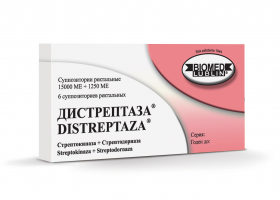Distreptaza
According to statistics, inflammatory diseases of the pelvic organs (inflammation of the ovaries, uterus, prostate, etc.) – is the most common problem in patients of reproductive (from 16 to 49 years1) age. These diseases are very insidious and dangerous because of risk of serious complications such as infertility, ectopic pregnancy, menstrual dysfunction, adhesive disease, chronic pelvic pain. If the inflammation occurred, the approach to the choice of treatment should be professional, balanced and comprehensive. It is included in the scheme of treatment: from the first days of treatment to restore blood flow, increase the concentration of AB in the inflammation, strengthen and accelerate the relief of the inflammatory process and prevent the formation of adhesions 2,3,4 – drugs containing streptokinase (e.g., suppositories Distreptaza); in case of the detection of the pathogen – antibacterials. Also immunomodulators, desensibilization drugs, symptomatic therapy (antispasmodics, analgesics), drugs to restore the vaginal flora in women are used2.
Distreptaza* – is an enzyme preparation, which contains a fibrinolytic – streptokinase (15 000 IU) and proteolytic – streptodornase (1250 IU). Distreptaza has a strong anti-inflammatory effect, improves microcirculation in the inflammation, relieves swelling, significantly increases the concentration of antibacterial drugs and immune cells in inflammation, accelerates the lysis of dead cells (pus) and their reabsorption (removal, cleaning) of the source of inflammation without affecting but preserving healthy tissue 3,4,6. The pain syndrome and dysuric manifestations (palpitations, painful urination, false urges to urinate) are eliminated in 2.5-3 times faster. When using the drug Distreptaza in the treatment regimen, by ultrasound signs of inflammation are eliminated faster, time spent in the hospital is reduced by 5 days, repair processes are accelerated in 3 times2,4,5,6,12.
It is important that the use of the drug Distreptaza reduces the risk of relapse, occurrence of infertility or of adhesive disease by 70%2,4-6. Thus, the inclusion of the drug Distreptaza in the treatment regimen of the inflammation allows to increase the effectiveness of treatment to 96 – 98%2,4,5,6.
Distreptaza is successfully used for the treatment of gynecological, urological pathology in proctology, in dermatovenereology, in the postoperative period in the practice of surgery, including pediatric surgeon6,7,8,9,12. Distreptaza is well known not only in the complex treatment of inflammation, but also in the treatment of male and female infertility, ovarian cysts, early rehabilitation after an abortion or after an interrupted pregnancy, after surgery in the abdomen and pelvis to remove adhesions and inflammatory manifestations6-9,12. Distreptaza is used alone for relief of aseptic inflammation and reduces pain in the treatment of chronic pelvic pain and adhesions process10,11.
Distreptaza – treatment of inflammation, adhesive disease, infertility.
Distreptaza: rectal suppositories No. 6: manufacturer “Biomed-Lublin” Vitvurnya Surovits and Schepyonek Spulka Aktsiyna (Poland ), r. с. No. UA/ 6931/01/01 dated 16.11.2012.
*Information for experts of Medicine and Pharmacy for the use in professional activities. Before use, read the instructions. Keep out of the reach of children.
1. Women’s health. Fact sheet N°334. Updated September 2013, www.who.int/mediacentre/factsheets/fs334/en/.
2. Order of the Ministry of Health of Ukraine dated 27.12.2011 No. 977 “On Making changes in the order of the Ministry of Health of Ukraine dated 15.12.2003 No.582″ On approving clinical protocols in obstetric and gynecological care”. Order of the Ministry of Health of Ukraine No. 431 dated 03.07.06. Clinical protocol of providing medical assistance in chronic prostatitis”.
3. Package insert for Distreptaza.
4. V.A.Potapov et al. Distreptaza – a new solution of the problem of pathogenetic correction of the inflammatory response and circulatory disorders of the pelvic organs in women with acute exacerbation of chronic salpingo-oophoritis. Reproductive health in women, 2008; 4 (38).
5. V.A. Potapov et al. Strategy of early postoperative rehabilitation of reproductive function in women with uterine leiomyomas. Women’s Health, 2012;10 (76).
6. B.M. Ventskovskyy et al. Modern tactics of treatment of chronic inflammatory diseases of the pelvic organs in acute stage (guidelines). MH of Ukraine, 2009.
7. E.A. Lytvynets et al. Treatment of men with excretory-toxic infertility caused by chlamydial infection. Men’s health, 2012; №1.
8. T.I. Tamm et al. Local treatment of surgical wounds in patients with acute paraproctitis using Distreptaza. Men’s health, 2012;3.
9. S.M. Onyshchenko et al. Distance results of surgical treatment of acute adhesive intestinal obstruction. Men’s health, 2012;3.
10. I.Z. Gladchuk et al.Prevention of adhesions after surgical treatment of infertile women with uterine fibroids and endometriosis. Reproductive health in women, 2008; 35 (39).
11. O.Yu.. Shcherbak et al. Use of Distreptaza in complex treatment of patients with dysuria after surgery for benign prostatic hyperplasia. Men’s health, 2009;4.
12. A. I. Senchuk et al. Optimization of treatment of patients with salpingoophoritis and menstrual dysfunction in women of reproductive age. Women’s Health. 2012; 10 (76): 1-8.



